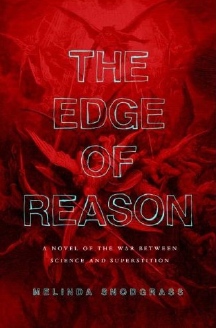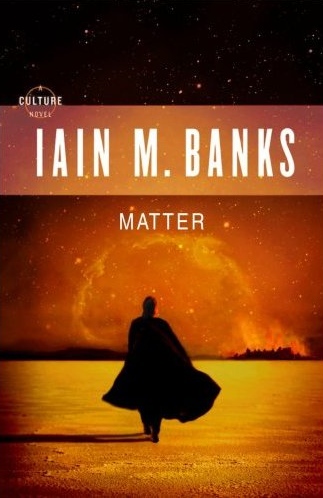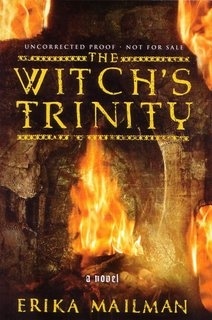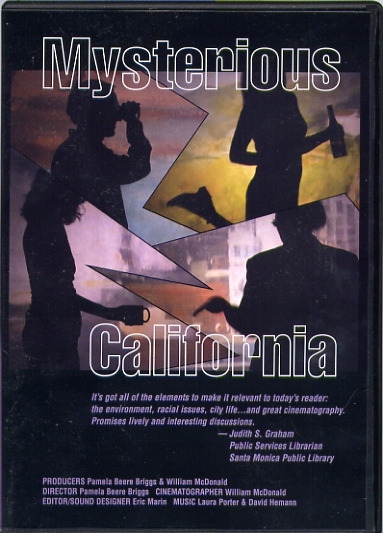|
|
|
|
This Just In...News
From The Agony Column
|
| |
|
02-22-08: John Varley Unleashes 'Rolling Thunder' ; Agony Column Podcast
News Report : A Conversation With Publisher Jack Estes
|
Poddy Sings
|

|
Funny
how a picture of a rocket ship is no longer rocket science.
|
Lieutenant Patricia
Kelly Elizabeth Podkayne Strickland-Garcia Redmond, that is, is a singer,
but not necessarily in the manner she tells you.
Well, sure, Poddy, as she's known, giving in to the single-name singer-name
aesthetic – can sing. She's a Martian. And she wants to be an entertainer
in the Music, Arts and Drama Division of the Martian Navy. This is of course
not your father's Navy. Let me take a stab and say that this is in fact more
Robert A. Heinlein's Navy, if not that of the uber-talented John
Varley. It is, after all his novel, 'Rolling Thunder' (Ace / Penguin
Putnam ; March 04, 2008 ; $24.95) where you'll meet Poddy and hear her sing.
I'm not kidding about hearing her sing. Open this book up and you'll be instantly
sucked in, even if you've not read the predecessors, 'Red Thunder' and 'Red
Lightning'. If you love to read, then there is no pleasure greater than picking
up a new novel by a writer who is absolutely, one-hundred percent on top
of it, a writer who grabs a voice and makes it sing. With 'Rolling Thunder,'
John Varley introduces Poddy – you only have to read and I only have
to type the whole shebang once. But no matter how many names she has, she
has only one voice that you'll hear -- her prose voice, as written by Varley
with the sort of verve that really could get you a gig singing, dancing or
whatever, the key word is entertaining.
Varley's always been brashly, over-the-top entertaining, so the chances are
you'll want to read the two preceding novels, 'Red Thunder' and 'Red Lightning'.
In fact, the chances are that you have, so let me put your fears to rest
and assure you that this novel "concludes the trilogy," though
it does not exclude another. I guess we can be thankful that Varley did not
feel so brash as to decide to blow up the entire solar system for the sake
of a Rock Video. But you know, if somebody has to do it, I'd prefer the event
be managed and directed by Varley.
|
Agony Column
Podcast News Report : A Conversation With Publisher Jack Estes
: Pleasure Boat Studio
|
|
|
Smilin'
Jack Estes (left), PBS Publication (right).
|
Today's podcast
is a conversation with publisher Jack Estes, of Pleasure Boat Studio
: A Literary Press. I've
been talking with Jack for a while now, since he brought out Irving
Warner's 'Wagner, Descending'. This is our first interview, however,
and he tells me a great story – how a guy just up and decides
to become a publisher, and what happens from the moment you wake up
with those bees in your bonnet to the moment you hold your first book
in your hands. Then the next, then the next. You
can hear how Jack Estes started his own literary press, with three
imprints, from this link to the MP3. You can find his website here.
And you can find the wherewithal to do this all yourself within, should
you dare.
|
| |
|
02-21-08: Melinda Snodgrass Goes to 'The Edge of Reason' ; Agony Column
Podcast News Report : Charles Bock First Book for NPR
|
Cops vs Gods
 |
|
| We'll
just nuke them damn Satans. |
You know Melinda
Snodgrass. You've seen her name on Star Trek books,
and in Wild Cards collections. Get ready to know her better.
'The Edge of Reason' (Tor / Tom Doherty Associates ; May, 2008 ; $24.95)
is one of those books that jabs just every sensibility in the eye with
a big ol' stick and a ripped from the (Weekly World News)
headline plot. Cops, gods and just about every being in-between are
mixing it up in New Mexico. That darn Apocalypse is just around the
street corner, and the homeless schizophrenic you tossed a dollar at
just happens to be the Messiah. Good call on the charity toss!
'The Edge of Reason' fires off as Officer Richard Oort tries to rescue a
teenage girl from some rather unusual pursuers. They're naked. And one of
them is made of sticks and mud. They make the electricity go off. This is
well beyond the pursuit handbook, which never explained the power of the
penny. Snodgrass does, in a scene that effortlessly combines supernatural
fantasy with police procedural crime fiction. But from then on out, things
get far more exciting than the usual mystery.
This would be because the mystery being solved here is nothing less than
that of Creation itself. On one side, we have the Old Ones. Do I need to
issue an H. P. Lovecraft citation alert? I thought not. Of course, the Old
Ones who are clearly beyond 'The Edge of Reason' are a much more hands-on
bunch than Lovecraft's dreamers. The Old Ones in this novel are wide-awake
and deeply inimical to humans. They feed off the suffering of men, at last,
so if you dont consider that inimical, then chances are youre
on their side – and youre not alone. On the other side of the
equation are the Lumina, who simply want to liberate the human spirit. Of
course that could be rather inimical to human life as well, depending on
how you define liberation. Let's presuppose it's a good thing and get straight
to the adventure aspect, which involves a conjunction of magic and religion
set forth upon Richard Oort and the collection of Lumina who gather to help
him. And yes, you should wonder about that last name. The only Oort I know
of is the Oort Cloud, a spherical cloud of comets that surround the sun and
define the Solar System.
Snodgrass, a seasoned pro, takes on this battle and brings it down to earth
with an oddball collection of characters you might meet on the way home from
the market, never suspecting that they were battling for the essence of mankind.
Reality itself is being ripped apart and what comes through the rents proves
to be unfriendly. And then there's the problem of belief – as in who
to believe. Because supernatural beings from another reality may omit some
bits of the truth that could give suffering and liberation a whole new meaning.
And then of course there are reader sympathies to think of as well. Because
while the author may hope that the reader sympathizes with the Lumina, that
may not be the case. One can imagine that the Old Ones reading 'The Edge
of Reason' may find it just as enjoyable as the Lumina and the humans. So
yes, you know Melinda Snodgrass, or at least, you may have thought you knew
her. But once you cross 'The Edge of Reason', you'll have the certainty that
comes with complete doubt.
|
Agony Column
Podcast News Report : Charles Bock First Book for NPR : 'Beautiful
Children'
|
|
Beautifully
written, not such a beautiful vision. Works for this too!
|
Today's Agony Column
Podcast News Report is a
high-quality MP3 of my
recent report for All Things Considered on Charles Bock and his novel
'Beautiful Children'.
[Please visit the NPR website and let them know if you like the story.]
This is a powerful novel that still lingers in my mind; I can go an
visit Ponyboy as he takes Cherie to her visit with Jabba the Hut, or
Newell as he and Kenny go to meet Bing Biederbixxe and get their comics
signed. The scenes are vivid and intense – artificial memories
implanted by reading a book. The beauty and power of a simple technology – reading – never
cease to amaze me. And for those who require that science fiction jolt,
heres one of my favorite quotes from 'Beautiful
Children':
"Shit happened, then more shit happened. That was the future."
|
| |
|
02-20-08: Iain M. Banks 'Matter' Reviewed by Richard Gingell ; Agony Column
Podcast News Report : Catching Up With Erika Mailman
|
Return to the
Culture
|
|
The
US Orbit debut by Banks, big news, big name.
|
Among the big news
stories of late last year was the arrival of Orbit in the United States. I
talked to Tim Holman, who is heading up Orbit here and in the UK, in
December, and of course, one of the big names on the horizon then
was Ian M. Banks. His new Culture novel, 'Matter' (Orbit / Hachette
Book Group ; February 27, 2008 ; $25.99), is now out in the states,
and I have to say that so far as book aesthetics are concerned, this
is a delight. It's big, the print is big, and the cover is classy though
a tad bland. Still, I pick up this book and it just screams, "Read
Me" – this to a man who has not yet read a Culture novel.
To review the book, I've brought in a comrade from KUSP, Richard Gingell,
who hosts Democracy Now in the slot just before my Talk of the Bay show.
It happens that he hails from the UK, and is a Banks fan who has read pretty
much everything else that Banks has written, so youre
getting your informed review right here. We'll look for more reviews
from Mr. Gingell, more books from Orbit and more books from Banks, with and
without the "M.".
|
Agony Column Podcast News Report : Catching Up With Erika Mailman
: The HWA and the Stokers
|
|
Beautifully
written, not such a beautiful vision.
|
Today's Agony Column
Podcast Report is a catch-up conversation with Erika Mailman,
whose book 'The
Witch's Trinity', has been nominated for a Stoker Award, nominated
by the Additions Jury, for "underpromoted books". Given that it was
promoted by the publisher as literature with the above ARC cover
rejected because it spoke too much of being "genre fiction" ayup,
I'll say it was underpromoted.
I selected this book, along with Dan Simmons' 'The
Terror' and Kathleen Ann Goonan's 'In
War Times', as the best books I read in 2007. Do note the historical
theme of all three books, which by and large, take place in the past, not
the future. My conversation with Erika, however, is firmly rooted in the
present, with background highlight "pterodactyl shrieks" of joy from
her ten-month old daughter. This is the polar opposite of a dry interrogatory
interview! This is a chat with a working writer who has two novels in progress
and does a column for a newspaper. You
want the writing life, you got it, shrieks included at no extra cost. Get
ready to shriek – and if you decide to sample some of these delightful
sounds, you are welcome to them, so long as you give credit to Erika's daughter.
(And buy her book.)
|
| |
|
02-19-08 :Agony Column Podcast News Report: 'Mysterious California'
|
A Criminal Environment
|
|
Literary
video worth your valuable time.
|
Here's one more
reason to live in California; The
California Center for the Book, here to "help librarians and
teachers get Californians reading." They have all sorts of advice
on how to get authors
to your library, some online video interviews and links to the
films of Pamela
Beere Briggs, the woman behind 'Women of Mystery.' Their
latest production is a "Bookclub in a Box," in this case
'Mysterious California,' a video by Briggs featuring four mystery writers – Laurie
R. King, Nadia
Gordon, Nina
Revoyr and Kirk
Russell – talking about how locations in California
inform their work.
|
|
|
|
 |
|
| Pamela
Beere Briggs, Laurie R. King, Nadia Gordon, Nina Revoyr,
Kirk Russel. |
Laurie R. King writes the Mary Russell and Kate Martinelli mystery books
and other stand-alone suspense novels. Nadia Gordon (aka Julianne Balmain)
writes the Sunny McCoskey Napa Valley mystery series, including 'Sharpshooter',
'Death by the Glass', and most recently, 'Murder Alfresco'. Nina Revoyr is
the author of 'Necessary Hunger' and 'Southland'. And finally, Kirk Russell
is the creator of the California Fish & Game Warden John Marquez novels.
I Was fortunate enough to get a call from Laurie R. King shortly before they
all met at Santa Cruz Public Library,
and I got them to sit down for a talk about mystery and place.
|
|
(Clockwise)
Kirk Russell, Nina Revoyr, Laurie R. King, YT, Nadia Gordon.
|
You
can hear the entire Mysterious California Panel Discussion in MP3 here. You
can order the video from this link, which hands you off to an 800
number, and chances are youre going to help more books get to
more readers as well as support the next literary video by filmmaker
Briggs. Between the discussion itself, and the bazillions of links
in this article, you should be able to keep yourselves quite busy – look
sharp, the boss is coming!
|
| |
|
02-18-08: A 2008 Interview with John Burnham Schwartz
|
'The Commoner'
|
|
Another
nice Nan A. Talese production. |
One of the most common
tropes in fantasy fiction is that of the sequestered princess, the supposedly-precious
but usually stalwart young woman locked
into a lifetime of ritual, set apart from the prying eyes of an imagined
world. Her struggles to escape, the intelligent but downwardly-mobile
young servant who is actually a noble-in disguise, the array of friends
and enemies, the magic beings that move the world according their own
arcane plans and desires – it's all so ho-hum, so programmatic,
that such material succeeds in the marketplace based on workman-like
execution and a welcome familiarity. We know what we're going to get
in advance and there is indeed a certain joy in watching the expected
come to pass in an unsurprising manner.
Reality, however, has a way of outstripping fiction. The real sequestered
princess – Empress Michiko of Japan – led a life both more
and less glamorous than that of any fantasy-novel heroine. Her story
cannot be told; nobody knows exactly what happened to her after she entered
the cloistered world of Japanese royalty, the once God-Kings and Queens
who lost their godhood in the shadow of the atomic bomb. In many senses,
'The Commoner' ( Nan A. Talese / Doubleday / Random House ; January 22,
2008 ; $24.95) by John Burnham Schwartz is a fantasy. Yes, he lived in
Japan for a period of time, and yes, he talked to more people who were
closer to the Emperor and Empress than most of us will even imagine speaking
with in a lifetime. But the real people remain sealed off, behind a wall
of ritual, tradition and secrecy that has not been broken to this day.
'The Commoner' changes names and kicks down doors to imagine a world
that actually exists and is stranger than many that are strictly imaginary.
|
|
In
the back office of the Capitola Book Café.
|
Burnham's work is carefully controlled, closely written and gorgeously
revealed. Much of the first portion creates the entire world of Japan
going into and coming out of World War II, setting the foundation for
Haruko, the commoner who will eventually be transformed into the Empress.
As we work our way into the mind of a modern Japanese woman about to
be thrust into a world of ancient ritual, Burnham's prose carries us
into a realm of pure fantasy and stark reality. Its a wonderful
performance that will delight those who read historical fiction as well
as those who read fantasy fiction. Trapped in "our beautiful prison," Haruko
flirts with madness, simply to deal with an new inner world that in comparison
to the modern history unfolding outside is indeed mad. The fantasy of
the Japanese court and the reality clash in the narrator's mind. It's
not a pretty picture, but it's truly compelling reading.
I spoke with Schwartz when he came to Capitola Book Café recently,
and we talked about the twisted history he echoes so effectively in his
novel, and about the research was able to do – and that which he
had to manufacture out of whole cloth. Here's
the MP3. You'll find Schwartz
to be as compelling as his novel and his subject. 'The Commoner' is being
marketed as literary historical fiction, and it is certainly a fine example
of this. But there's a pretty large segment of fantasy readers out there
who might find this equally appealing. It is indeed a fantasy, in the
sense that all fiction is a fantasy. The imagination leaps – and
readers follow.
|
| |
|
|
















